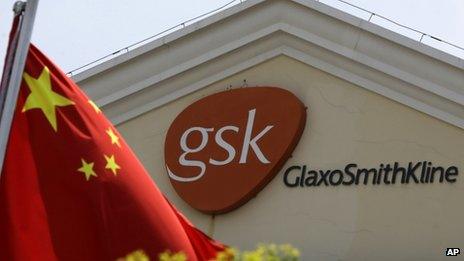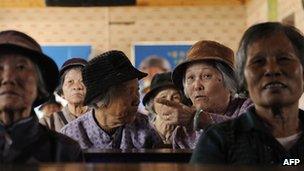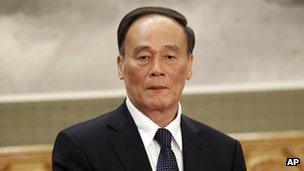Viewpoint: Why is China investigating GlaxoSmithKline?
- Published

GSK has been accused of facilitating bribes to doctors and officials
The corruption investigation launched by the Chinese authorities against GlaxoSmithKline (GSK) continues to pass like a whirlwind through the firm's Chinese operations, throwing into chaos the company's carefully laid plans for expansion in one of its most promising markets.
Other foreign investors have looked on with a mixture of horror and sympathy: China is a complicated market with many grey areas, and most firms live in fear of the day they draw the unwelcome attention of the state.
Much of the overseas media coverage has also leaned towards the sympathetic side, noting that the medical industry is renowned for shady dealings and implicitly suggesting that GSK has been unfairly singled out.
As the Chinese saying goes, you kill a chicken to frighten the monkey - and if that chicken is foreign, well, all the better.

Does China want cheaper medicines to support its ageing population?
It is easy to see why this attitude has been adopted. State investigators have form in targeting foreign companies when they wish to make a point, despite the fact that local competitors in the same markets are often engaged in much more flagrant breaches of the law.
Whether it is Wal-Mart over mislabelled meat, or Unilever over pricing policies, prominent multinationals frequently find themselves dragged into the media spotlight as the government seeks to show it is tackling an issue of social concern.
Yet there are compelling reasons to believe that this is more than a traditional case of "chicken killing".
Although GSK has been the first to be targeted, the investigation into pharmaceutical pricing policies continues and is reported to involve dozens of firms, both foreign and domestic.
A narrow interpretation is that the government is moving to rein in its bill for medicines.
The population is ageing and China is rapidly rolling out an expansion of the public health system. Any tactic that can serve to put pressure on the drug companies to lower their prices should help to provide welcome relief from the pressure on government finances.
However, it makes sense to see the GSK case in an even wider perspective.
Culture change?
Since he was elevated to the head of the ruling Chinese Communist Party in November 2012, China's leader, Xi Jinping, has launched a high-profile campaign against official corruption and extravagance.
This in itself is not especially unusual - his predecessor, Hu Jintao, did something similar on assuming the top office. Nevertheless, the strength and duration of the current anti-corruption drive have taken many by surprise.
Perhaps they should have seen it coming: the elevation of Wang Qishan to the head of Party's disciplinary body last November signalled that the incoming leadership was taking corruption seriously. Mr Wang used to be known as "the fire-fighter" for his reputation in tackling crises, most notably when he was parachuted in to become mayor of the capital, Beijing, amid the Sars outbreak of 2003.
Tackling corruption within the party and the government remain important challenges, but for China as a whole it is just as important to break the culture of disregard for the law that has developed in the business community.
This problem lies at the bottom of many of the country's most persistent challenges, from environmental pollution to food quality scandals.

Wang Qishan has a reputation for tackling crises successfully
There is of course a vast difference between bribing doctors to supply efficacious medicines and cases like the melamine milk scandal of 2008 that left hundreds of thousands of infants poisoned. Yet both scandals show corporate executives willing to ignore the law in order to get ahead of the competition - presumably in the belief that they won't get caught.
Breaking this belief in impunity is essential if China is to move towards becoming a more developed society.
It may eventually turn out that the pharmaceutical pricing investigation is just another isolated development: a case of the government wielding a club with one hand to pinch pennies with the other.
But foreign companies operating in China need to be aware that in the longer run, the grey areas that so many firms operate in will gradually close down as the government enforces better corporate governance.
In recent years many head offices have allowed their China operations free rein in order to give them the flexibility necessary to expand rapidly in the country's boom times.
If the coming change in regulators' attitudes is not to catch them by surprise, they may need to crack the whip again.
- Published1 August 2013
- Published25 July 2013
- Published24 July 2013